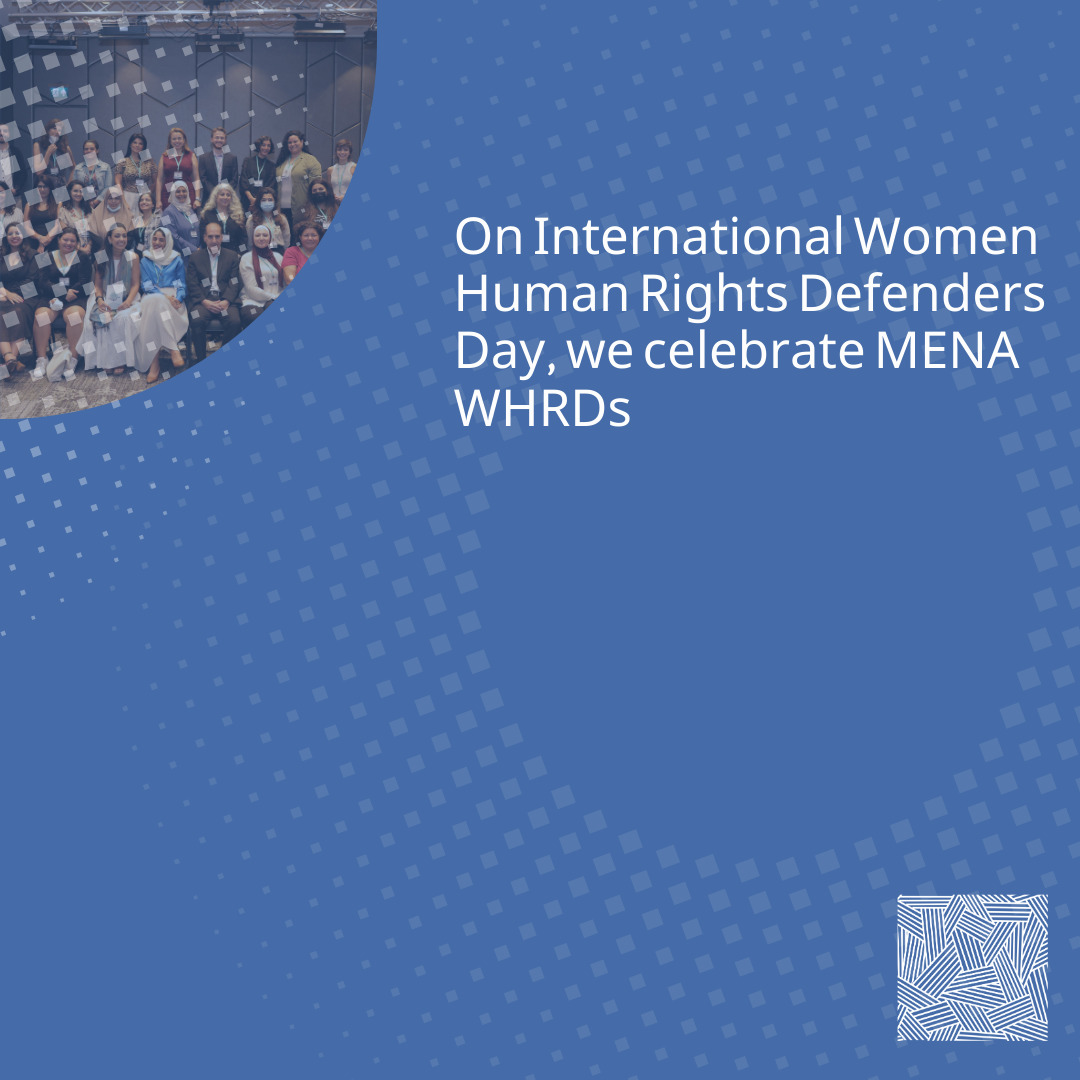
On International Women Human Rights Defenders Day, we salute all women human rights defenders (WHRDs) while highlighting the achievements of those who attended the Middle East and North Africa (MENA) Regional Forum for WHRDs.
Organized by the Innovation for Change (I4C) Network – Middle East and North Africa and the Gulf Centre for Human Rights (GCHR), the MENA WHRDs Forum was held in September 2022. A group of women human rights defenders from Iraq, Jordan, Lebanon, Palestine, Algeria, Yemen, Sudan, Morocco, Tunisia, Libya, Syria, and Bahrain participated in the Forum, working on various human rights issues.
It was the first time MENA WHRDs assembled in a location they had designed for themselves. A series of community of practice (CoP) meetings were organised prior to the Forum, which contributed to the development of the Forum agenda and its main themes.
The Forum aimed to create a safe space for women human rights defenders from countries in the region in order to share their experiences and stories, to inspire each other, celebrate their successes, and respond to the challenges they face.
The Forum also aimed to build sustainable frameworks in order to increase the level of influence and create spaces in which women human rights defenders have ownership of their campaigns and narratives.
At the opening, Reem Al-Salem, United Nations Special Rapporteur on violence against women and girls, said, “There is a weakness in the information that we receive about the status of women’s rights in the region, and this is due to many reasons, including the severe restrictions on civil spaces in the countries of the region.”
Five WHRDs were interviewed by the prominent journalist Diana Moukalled, including a woman from Iraq who told a harrowing story of survival. She must remain anonymous for safety reasons.
Ebtisam Al-Saegh, a Bahraini WHRD, was arrested, assaulted, harassed and imprisoned several times. Her phone was hacked with the notorious Pegasus spyware. In 2017, she was summoned for interrogation late at night. “During this interrogation, I was subjected to physical and verbal abuse, in addition to various forms of torture,” she said. The experience was traumatic, and Al-Saegh’s family was targeted, with the arrest of her son, in addition to the constant harassment of her daughter at the university. Yet, she has supported a large number of victims of human rights violations in Bahrain. This fueled her determination to keep fighting and motivates her to keep reminding others of the victims’ sacrifices. Watch her video here.
Jordanian lawyer Hala Ahed works on issues pertaining to demonstrators and prisoners of conscience, and cases of women subjected to gender-based violence. Her phone was also hacked using Pegasus, but she continues to work on many issues, including child marriage. “Exploiting the fear of a deterioration of the situation, as in the rest of the region’s countries, exacerbated the situation of violations in Jordan,” she said.
“Hacking can turn into a weapon to assassinate defenders, especially women defenders,” said Marwa Fatafta, policy advisor for the MENA region at Access Now, from Palestine. She added, “Political repression methods, defamation and harassment force women defenders to withdraw from public life.” Watch her video here.
Sanaa El Aji, a journalist and editor of “Marayana” (Our Mirrors) website from Morocco, works on critical and intellectual political, religious and social issues. She says, “Many, including a significant number of human rights activists and leftists, still consider defending women’s rights and individual freedoms (freedom of belief, sexual freedoms, etc.) a mere human rights luxury, and they may sometimes imagine that the woman you are defending is a ‘permissible woman.'” She added, “This complicates her task and her daily life.”
Weaam Youssef, GCHR’s WHRDs Programme Manager, said, “Despite all odds and continuous backlash, women human rights defenders will continue this journey. It is not an easy one, but it is inevitable and needed. We will carry on with our collective work in all spaces whether or not they are as safe as this one, where inspirational ideas are generated and projects of significance are created. Even in challenging spaces where we often work within, we thrive in solidarity! Sustaining safe spaces for WHRDs to meet and reflect is indispensable to sustain our movement.”
“The essence of women’s struggle is solidarity and diversification of work tools,” said Sarah Sheikh Ali, Chair of the I4C MENA Board of Directors, at the opening of the Forum. “We hope that the Forum will be a space for rethinking the tools for the work of women human rights defenders and reformulating their own narratives.”
The Opening Day was followed by two days of training workshops, with innovative aspects of well-being and self-care, including creative activities, where action plans were developed for digital security, advocacy and protection and to sustain co-working spaces for MENA WHRDs.
Watch a short video from the Forum here, and all the videos from the Forum here: YouTube Playlist
download the MENA WHRDs Forum Report from here